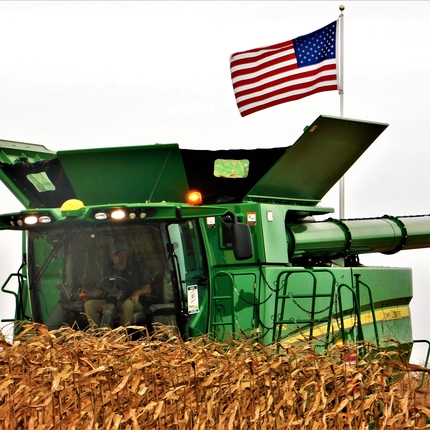By Cody Smith, former staff member
The steady hum of engines, the smell of diesel fuel in the air – the 2018 Farm Progress Show was in full swing.
From Aug. 28 to 30, the nation’s largest outdoor farm show attracted farmers, ranchers, policymakers, and agricultural professionals from around the globe. Hosted in Boone, Iowa, the event celebrates advancements in agricultural technology and hosts field demonstrations for farmers and ranchers, among several other activities. Perhaps most importantly, the Farm Progress Show provides attendees with a glimpse into the future of the agriculture industry and the policy it will require to be productive.
Crawling with young farmers and ranchers, the event radiates a sense of optimism for the future. Those in attendance observe an impressive diversity of age, race, gender, ethnicity, knowledge, and thought. These budding farmers and ranchers may face challenges as the roots of their careers begin to take hold.
For many young farmers, access to capital, land, education, and trusted networks can inhibit their entry into production agriculture. These challenges impact beginning farmers in every state. Farmers with socially-disadvantaged identities, such as Latino, African-American and veteran farmers, grapple with language barriers, discrimination, and a lack of access to established networks of farmers each day.
The buzzing conversation that blanketed the Farm Progress Show was filled with hope for the future, and one thing was undeniable – beginning and socially-disadvantaged farmers need policy that supports them.
Coincidentally, the Farm Progress Show occurred as the 2018 farm bill conference committee was forming and priorities were being identified by committee leadership. Conferees are now debating the future of farm bill programs which help provide important training and resources.
As the farm bill conference committee pushes forward, the debate focuses on competing proposals from the House and the Senate. While both bills include the Beginning Farmer and Rancher Development Program and the Outreach and Assistance to Socially Disadvantaged and Veteran Farmers and Ranchers Program, the Senate bill takes a more comprehensive, supportive approach. Under the Senate proposal, the programs would be combined into a new Farming Opportunities Training and Outreach Program.
The Farming Opportunities Training and Outreach Program would provide mandatory, sustainable funding for programs that support our beginning farmers – something that is clearly demonstrated at agricultural gatherings nationwide.
Whether it is the Farm Progress Show, or other events, policy that supports America’s young and beginning farmers is crucial to building a resilient agricultural system.





